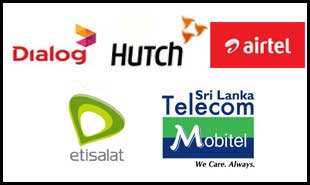
By Indika Sakalasooriya
The five mobile service providers in the country gathered for a crisis meeting last Friday, to discuss possible actions to avert impacts of the farreaching tax proposals of the new government on the sector.Mirror Business learns that the possibility of taking legal action was also discussed, among others, if the government went ahead with enacting laws demanding celcos to pay the 25 percent reload tax.
In the revised budget of Maithiripala Sirisena government presented in January, celcos were asked to pay 25 percent tax to the government on reloads, without passing it on to customers.Officials representing Mobitel, the second largest celco operator in the country in terms of subscriber base, had reportedly said they wanted to consult their superiors before committing to any lobbying action. Mobitel is the mobile arm of state-controlled Sri Lanka Telecom.
UAE-based officials of Etisalat, the parent of Etisalat Lanka, who had flown down to engage the local authorities over the tax issues, also attended the meeting, Mirror Business learns.Sri Lanka’s mobile telephony industry is already going through a difficult time due to squeezed margins and ever i ncreasing capital expenditure as a result of technology upgrades.
The telecom sector is among the worst-hit industries by the revised budget of the new administration.Apart from the recurring 25 percent tax absorption on reloads, all licensed mobile operators were slapped with a Rs.250 million oneoff levy.Rs.1 billion one-off tax was also imposed on satellite TV operators. Dialog Axiata, the leading in mobile service provider in the country, also has a satellite TV subsidiary.
The government estimates around 50,000 satellite TV subscribers in the country.Stockbroker Bartleet Religare Securities has estimated t he total hit on Dialog Axiata to be approximately Rs.6.3 billion this year. The recurring element of the 25 percent tax absorption on reloads alone would be about Rs.3.7 billion, t he brokerage noted.
Dialog Axiata releasing its FY14 performance said it paid the government Rs.24.4 billion by way of taxes, levies and fees during the year. Dialog’s capital expenditure for the year was Rs.15.2 billion.However, analysts opine higher taxes could result in a positive development, as mobile operators will now have to seriously explore the option of consolidation.
The overcapacity in the country’s mobile telephony sphere has resulted in dwindling margins and duplication of infrastructure, depriving muchneeded capital expenditure for technology advancement.In a recent report, Fitch Ratings said, exit of two weaker mobile operators would benefit the industry in general and the remaining players as data tariffs could rise following consolidation, and this would slow the decline in profitability and prevent duplication of capital expenditure.
